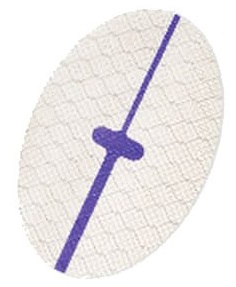 (April 20, 2018) – Hernia mesh pains Irish men, the BBC reported late last year. In America there has been almost a complete news blackout concerning the tens of thousands of women injured by transvaginal mesh, despite several large jury verdicts. There has also been a near-total blackout on people injured by hernia mesh.
(April 20, 2018) – Hernia mesh pains Irish men, the BBC reported late last year. In America there has been almost a complete news blackout concerning the tens of thousands of women injured by transvaginal mesh, despite several large jury verdicts. There has also been a near-total blackout on people injured by hernia mesh.
In the UK, however, the BBC has reported on transvaginal mesh problems and also on men in Northern Ireland reporting personal injuries from hernia mesh. Here’s the story from Sept. 20, 2017 at BBC News.
The men report post-surgical complications that include chronic pain and the inability to work or enjoy their lives. As in the U.S., the denial of complications from the medical community is a constant complaint of the men interviewed in the BBC story.
Injured Men call for Mesh Ban
The use of mesh is Northern Ireland’s National Health Service’s recommended treatment for groin hernias. The group of injured patients has called for a ban on the polypropylene (plastic) mesh material.
One Million Hernia Surgeries yearly
The U.S. Hernia Society says one million hernia mesh surgeries are performed yearly. Approximately one in ten people will develop a hernia in their lifetime. Most doctors continue to use plastic mesh despite a complication rate estimated to be as high as 30%.
Owen Smith, Labor Party, Northern Ireland
A member of UK’s Shadow Cabinet of Northern Ireland, Owen Smith, said he has been shocked by the stories he has heard. Mr. Smith believes the mesh issue will become one of the biggest in the UK since breast implants. He has set up a parliamentary group to study mesh problems.
The Department of Health and the Public Health Agency recently conducted a workshop to establish a standard approach through northern Ireland for women with mesh complications.
Ten Deaths Associated With J&J Physiomesh Hernia Mesh
At least 10 deaths and seven injuries have been associated with Physiomesh™, hernia mesh made by J&J. Those deaths were reported to the U.S. Food and Drug Administration. Experts know that a mere 1-10 percent of actual adverse events are reported to the FDA’s MAUDE database, which could mean the actual death toll is closer to 100.
Plastic Hernia Mesh
Johnson & Johnson and other transvaginal mesh makers continue to face thousands of lawsuits in the federal MDL court set up in West Virginia, as well as in state courts across the country. The polypropylene plastic used in the transvaginal mesh is virtually the same as the plastic mesh used in troublesome hernia meshes. The material itself continues to be a bone of contention between companies that make and/or use the mesh and plaintiffs’ attorneys representing women and men who allege injuries from that mesh.
Foreign Body Reaction
The human body launches a foreign body reaction against any extraneous material with which it objects. Mesh makers claim their meshes use the human body’s foreign body reaction in a complementary way which helpfully “meshes” the plastic material with the body’s tissues. Plaintiffs who attribute their injuries to the mesh often include in their claims the argument that the foreign body reaction sets off a chain of events that leads their bodies to completely reject the invading mesh. Some plaintiffs claim this foreign body reaction to reject the mesh is part of a design defect. Some claim it causes an auto-immune response which exacerbates the physical pain mesh can bring when it fails to “mesh” with the human body as it is designed to do. The foreign body reaction dispute is but one of many issues which become part of most hernia mesh lawsuits or transvaginal mesh lawsuits.
Our law firm and others have settled thousands of transvaginal mesh lawsuits. Now, more lawyers are turning their attention to hernia mesh. Unlucky hernia mesh recipients have reported the same complications which transvaginal mesh patients reported – chronic pain and infection, mesh shrinkage, mesh migration, organ perforation, auto-immune sickness, and more.
Physiomesh Hernia Mesh Lawsuits
Lawyers are focusing on coated hernia meshes. They are specifically examining Atrium C-Qur and Physiomesh™ made by Ethicon, a division of Johnson & Johnson. J&J’s Ethicon division recalled Physiomesh™ from the market in May 2016.
Two unpublished studies found Physomesh™ had higher failure rates for laparoscopic ventral hernia surgeries than other meshes used in a German and Danish Medical Registry.
Jane Akre of Mesh News Desk reported that the Voluntary product recall states that unpublished data found, “The recurrence/reoperation rates (respectively) after laparoscopic ventral hernia repair using Ethicon Physiomesh™ Composite Mesh were higher than the average rates of the comparator set of meshes among patients in these registries.”
Estimates say 300,000 patients have been implanted with Physiomesh since it was cleared by the FDA for sale via the 510(k) process in 2010.
Related
- Physiomesh Lawsuit – Hernia Mesh Lawsuits
- Hernia Mesh vs. Suture Repair
- Hernia Mesh Lawsuit
- Hernia Mesh 10-20% Complication Rate, says Surgeon
- Ten Deaths Linked with Hernia Mesh

by Matthews & Associates




